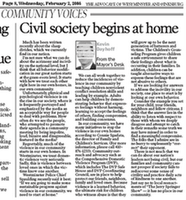

Domestic Nonviolence
A Civil Society begins at Home
_____
February 2nd, 2005 by Westminster Mayor Kevin Dayhoff (528 words)
Note: This column first appeared in the Westminster Advocate on February 2nd, 2005. The Westminster Advocate web site does not have this column available – and so it is re-printed here for future reference. / Kevin Dayhoff, October 28th, 2006.
_____
Much has been written recently about the sharp divides in which we currently find our nation. I’m not sure what we can do about the acrimony and incivility on the national level, but I think that all behavior modification in our great nation starts at the grass roots level.
It starts with how we treat each other right here in our own homes, in our own community.
Unfortunately, physical and psychological violence is on the rise in our society; where it is frequently portrayed and emphasized by the media as an acceptable way for people to deal with problems. How often do we see featured in the media, the one person in the community meeting that attempted to promote their agenda by being impolite, loud, bizarre and disagreeable.
Regrettably, much of the violence in our community starts in our own homes. In Westminster, we treat domestic violence very seriously. Sadly, this is violence between loved ones in which the victims know one another.
Westminster Police Chief Spaulding recently said it best: “If we are going to make some sustainable progress against violence in our community, we need to start at home.”
We can all work together to reduce the incidences of violence in our community by teaching children non-violent conflict resolution skills and leading by example. Adults can help children by demonstrating behavior that express feelings without harming, learning to accept the feelings of others, finding compromise, and building consensus.
In our community, we have many initiatives to stop the violence in our own homes according to Connie Sgarlata, the Director of Family and Children’s Services. (For more information, please call (410) 876-1233).
Community outreach and advocacy such as the Comprehensive Domestic Violence Program (DVP), which includes The DVP Safe House and DVP Coordinating Council, are in place to help protect our friends, neighbors, family and loved ones. Because violence is a learned behavior, the ultimate risk for children who witness abuse is that they will grow up to be the next generation of batterers and victims.
The Children’s Counseling Program gives children a safe environment to share their feelings about what is occurring in their families. In addition, children can be taught alternative ways to express these feelings that are not abusive to others.
If we are looking for answers to address the incivility in our society, one place to start is by looking at our own behavior. Consider the example you set for your child, your friends, neighbors and fellow citizens.
I think that the answer lies in the ability to listen with respect to those with whom we deeply disagree, in an attempt to catch in their remarks some truth we may have missed, in order to find a meaningful compromise.
The folks that I admire are in no hurry to unpleasantly “correct” their opponent. There is not much that we can do about our nation’s leaders not being civil, but our families and community cannot prosper if society fails and we don’t rediscover some sense of civility and practice daily acts of kindness to one another.
Just so no to local reenactments of the Jerry Springer Show – it has no place in our community.
Kevin Dayhoff writes from Westminster Maryland USA.
E-mail him at: kdayhoff@carr.org
####
Kevin Dayhoff writes from Westminster Maryland USA. E-mail him at: kdayhoff@carr.org www.thetentacle.com Westminster Eagle Opinion and Winchester Report www.thewestminstereagle.com www.kevindayhoff.com has moved to http://kevindayhoff.blogspot.com/


